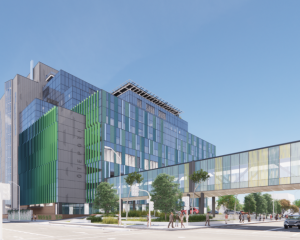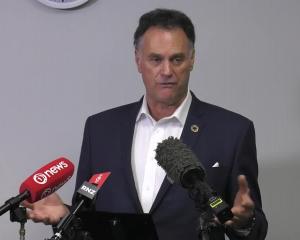
Anaesthetist Dr James Clark said the issues had been ongoing, and last week’s leaking in the main theatre store for sterile equipment — which caused a partial collapse of the ceiling — was just the latest example of the hospital woes.
Apart from dealing with issues where sterile equipment was stored, there were also problems with the area where equipment was sterilised, he said.
"To this day we live in hope that eventually, we might be able to start a list without having to face the realistic possibility that the supposedly sterile equipment which will be used to operate on a living human is, in fact, not free from human remains.
"For reference, it happens several times a month that we can’t start an operating list due to ‘contamination’ of supposedly sterile equipment."
Dr Clark acknowledged the sterilising unit, which was "35 years past its use-by date" actually got some funding in the last Budget.
They were, however, still waiting for the funding to be implemented, he said.
The overall state of the hospital "saddened" him, and, as recently as last week, he had to operate out of a "former storage room".
"I start my day by pushing a patient bed literally uphill to the left down a corridor which sags sufficiently that unsuspecting newcomers routinely run equipment into the right-hand wall."
He said it hurt to know people had to "endure needless waits of months to years to have their hip replacements, when all we need is a little more space".
The news of Dunedin Hospital’s continuing woes come as the government decides between retrofitting the existing hospital or pushing ahead with a downscaled version of the new Dunedin hospital project.
The budget for either has been capped at $1.88 billion and a decision is due soon.
Dr Clark, who was the operating theatre suite clinical lead on the project, said he was less than optimistic.
"I eventually stepped back as it became increasingly apparent to me that the scope of the build was rapidly being clawed back from the point of having a great new hospital (2019) to a good enough one (2021) to a barely adequate one (2022), at which point the trajectory became sadly apparent.
"It beggars belief that decisions which have been reached between experts over many years of deliberations have been cast aside because a quote from 2017 astonishingly doesn’t build a fit-for-purpose hospital in post-Covid 2024."
HNZ Southern head of infrastructure Dr Rob Ojala said the sterile services department was essential to the successful operation of Dunedin Hospital.
"We accept the current facility is inadequate and insufficient to meet future demand.
"In August this year, we committed to investing $14 million to develop a new facility for sterile services ahead of the broader hospital redevelopment."
This project was under way and was expected to be completed in time for the opening of additional operating facilities in the new Dunedin hospital outpatient building, now under construction, he said.
"No additional funding had currently been allocated for the sterile theatre stores department where a leak occurred recently. This leak was repaired on November 25 and occurred in the plant room above."












